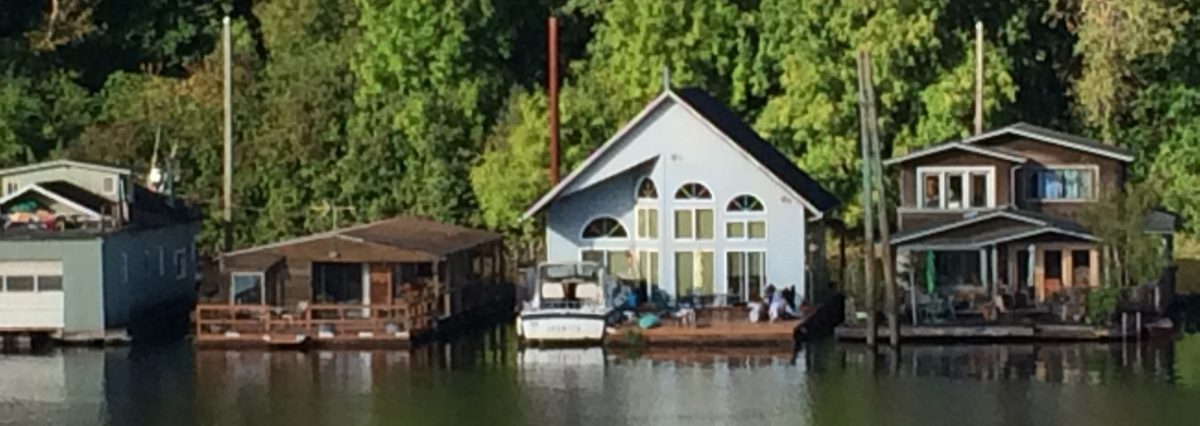We had a hearing on on March 4 in front of the Senate Housing Committee where we testified in support of our bill.
It was a busy day and we were each allotted only 3 minutes to state our support of the bill. Anyone that knows me also knows how passionate I am about floating homes and our issues. I tried very hard to prepare a 3 minute testimony, but I also felt that there are so many misconceptions about floating homes that some background and context needed to be provided so that urging the Senators to our support of the bill made sense to them. I wanted to ensure that floating homes issues were on their radar. In the end, I hoped that they would give me more time to testify and they did!
The Senators gave me permission to continue well-past the 3 minute limit – they seemed engaged and fascinated to learn out our unique floating homes!
The testimony witnesses were John VanLandingham (tenant representative), Chuck Carpenter (park landlord representative), John DiLorenzo (landlord representative), Nancy Inglehart (park tenant representative), Angela Garvin (marina tenant representative), Stan Tonneson (marina landlord representative), and Charlie Greeff (landlord attorney representative). John said afterwards that “Angela made quite an impression; two of the committee members that we met with this week could only remember the hearing and our bill when we mentioned the marina witness.”
There are two ways to review the testimony.
- I submitted testimony in written form in advance of the hearing, just in case we were not able to testify or in the event that my verbal testimony was too long and they “gonged” me (late 70s TV game show reference). You can read that written testimony here: https://olis.leg.state.or.us/liz/2019R1/Downloads/CommitteeMeetingDocument/166612
- All hearings are videotaped and available to the public. So, you can actually see how the hearing played out. My verbal testimony was shortened from the longer written testimony submitted and was also reordered for more impact, given the short amount of time we were given. The maria portion of the video testimony starts at minute 25:39 and lasts about 10 minutes: http://oregon.granicus.com/MediaPlayer.php?view_id=6&clip_id=26036&meta_id=1246351
To read all of the written testimony from March 4th: https://olis.leg.state.or.us/liz/2019R1/Measures/Exhibits/SB586
To view the entire video testimony from March 4th: http://oregon.granicus.com/MediaPlayer.php?view_id=6&clip_id=26036&meta_id=1246351
We had a VERY busy January, February and March working through some glitches with the language. So, in summary, here is where we are:
- The Floating Home Marina portion of the bill is largely correct as written in SB 586.
- We are already aware of a few corrections on the marina portion which still need to be made – so if you choose to read through it and happen to see a few details which slightly confuse you – we are aware. Our coalition does not write our bill – Legislative Council does this task (our assigned LC was somewhat new and overloaded with work) – so there were a few interpretations of our ideas which were drafted which need to be finessed to match our intent.
- In order to not slow down the process and risk the entire bill’s success, the plan is to get our bill voted on and approved by the Senate and THEN make those needed amendments prior to its vote in the House. Ideally, all of this would have been locked down in the fall. But our marina bill is part of a bigger bill and there were 2 issues in the larger bill which required negotiations past the deadlines for bill submission. Those 2 issues (mandatory mediation for park/marina landlords and tenants and improving the park/marina eviction language so that tenants cannot get eviction notices for minor park/marina rule infractions) were not marina-specific issues but DO affect marinas. So it was important to get those right even if we missed the deadline to include them in the first go around
- We have a Senate work session scheduled for the bill on April 1, 2019. Because the bill will not be complete when we get to the April 1 work session, the plan is to move it through the Senate and then complete the amendments – adding the Big Three issues and getting the others right – for the House to consider. That will give our Legislative Counsel enough time to get the bill language right.
- We anticipate the Senate voting this through and then it will be assigned to a House Committee and worked over in the House. This is when we will add the 2 issues via amendments and fix the language to match our intent on all topics.
- If approved in the House, then it will go back to the Senate for a vote on the amendments.
We wil keep you posted.
Please try to forgive any delays in my posting updates. I have gone back to work full-time in my normal life, so I will be busier than usual. Thank you, in advance, for patience.
